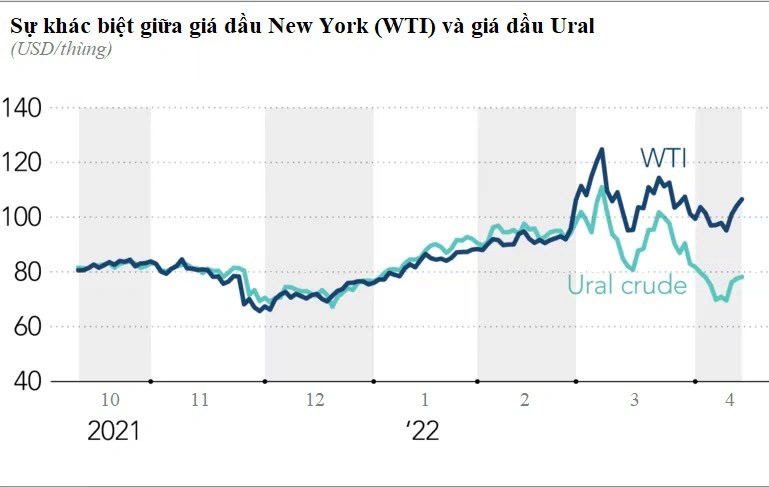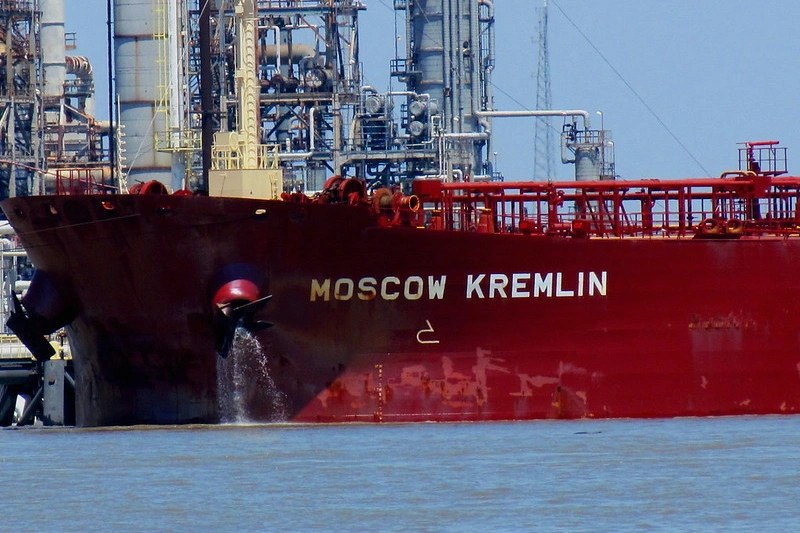Russian oil massively poured into Asia
From February 24 to April 18, a total of 380 oil tankers left Russia, according to data from global financial data company Refinitiv. This number increased slightly compared to the same period last year.
Of the 380 tankers that left Russia on February 24, 115 were headed for Asian countries. Specifically, China received the most with 52 ships. Following is Korea with 28 ships, India with 25 ships. Japan and Malaysia received 9 and 1 Russian tankers, respectively.
Notably, compared to the same period last year, the number of oil tankers to India increased by 900%, while China was 33%. The rest of the countries receive less oil from Russia than in 2021.
Leading Western economies such as the US and UK have announced they will stop importing crude oil from Russia, part of a comprehensive effort to punish Moscow for the situation in Ukraine.
Even before the US and UK governments made the decision, some major energy companies of the two countries such as BP and Shell announced that they would not continue to buy crude oil from Russia due to pressure from shareholders, risks of prestige, as well as logistical difficulties.
 |
| The price of Russian Ural crude oil is currently much lower than the world oil price. Source: Nikkei Asia . |
As a result of the withdrawal of Western importers, the price of Russian crude oil fell sharply, although world oil prices remained at record levels. In the period from early March to mid-April, the price of Russian Ural oil from 111 USD /barrel fell to 78 USD /barrel, or 30% of its value.
The Ural oil price movement offers opportunities to make profits for countries willing to do business with Russia.
“We started buying and have received an amount of oil equivalent to our consumption in 3-4 days. And we will buy more. National interest comes first, why not buy when fuel is low. prices,” said Indian Finance Minister Nirmala Sitharaman.
Bloomberg reported that Russia is offering crude oil to India at a price of $55 per barrel, which is only 50% of the price on the international market.
Vandana Hari, CEO of market research organization Vanda Insights, said that Russian crude oil is an “attractive option” for many countries.
Experts say that India and China, two countries considered by Moscow to be “friendly” partners, will continue to take advantage of the price difference to buy Russian oil on a large scale.
Meanwhile, Indonesia’s energy ministry said it has not bought Russian oil in recent years. However, the debate over the possibility of buying cheap oil from Russia has begun to heat up in Jakarta.
Daniel Gerber, CEO of oil and gas transportation company Petro-Logisitics, said Indonesia and Singapore are likely to take advantage of the current situation to profit from cheap Russian oil.
“March imports were unchanged, but we believe oil imports will increase sharply in the next 2-3 months,” Mr. Gerber said.
Asia is difficult to be an alternative market
Asian countries assume that the West continues to buy Russian oil, so there’s no reason why they can’t do the same.
Indian Foreign Minister S. Jaishankar said that compared to February, Europe increased crude oil and gas imports from Russia by 15% in March. Meanwhile, crude oil New Delhi bought from Russia accounted for only less than 1% of India’s needs.
“I’m pretty sure that if we wait another two to three months, we’ll see who are the biggest buyers of Russian oil and gas. It wouldn’t be surprising if the list wasn’t much different from before,” Jaishankar said.
Vandana Hari, CEO of Vanda Insights, thinks that the boycott of Russian crude oil and gas by some Western companies is just symbolic.
In fact, in the period 1/3-15/4, at least 41 oil tankers from Russia docked in the Netherlands. These numbers for Italy and Germany are 36 and 9.
However, since the beginning of April, pressure to monitor imports and remove Russian crude oil from the Western public is mounting.
 |
| A Russian oil tanker. Photo: AFP . |
The energy export industry brings Russia 235 billion USD in 2021, accounting for nearly 50% of Russia’s export value.
Some Western countries believe that without directly targeting Russia’s huge energy revenue, other sanctions will not be effective.
Although Asian governments have not or have not boycotted Russian crude oil, logistical difficulties are a barrier to Asia becoming an alternative European market for energy that Moscow is willing to sell at a price. cheap.
For decades, the main market for Russian energy has been Europe. Russia does not currently have large enough pipelines to supply oil to Asia on a large scale. The pipeline connecting Russia’s Far East with China has just been built and will not be operational for the next 2-3 years.
Therefore, the only option is to transport by large tankers, which require more insurance procedures and are more expensive.
“We do not own oil tankers, it is very difficult to find tankers ready to go to Russia now because shipping companies are increasingly concerned about the risks in doing business with Russia, even in the same Far East,” the representative said. representative of Japanese oil and gas company Taiyo Oil said.
After Western sanctions, insurance companies began to refuse to underwrite ships carrying Russian crude.
Taiyo Oil has an oil refinery near the port of Kikuma, Ehime Prefecture in Japan. In March, the company purchased Russian oil through a pre-signed long-term contract. But due to logistical and procedural difficulties, Taiyo Oil said it is now looking for alternative sources of supply from the Middle East, North America and Southeast Asia.
“We used to buy Russian oil because it was cheaper. The company also wanted to reduce the risk of being too dependent on Middle Eastern oil. But from now on, we will have to accept higher transportation costs,” the representative said. Taiyo Oil Company said.
Source: Zingnews.vn
Source: Vietnam Insider
